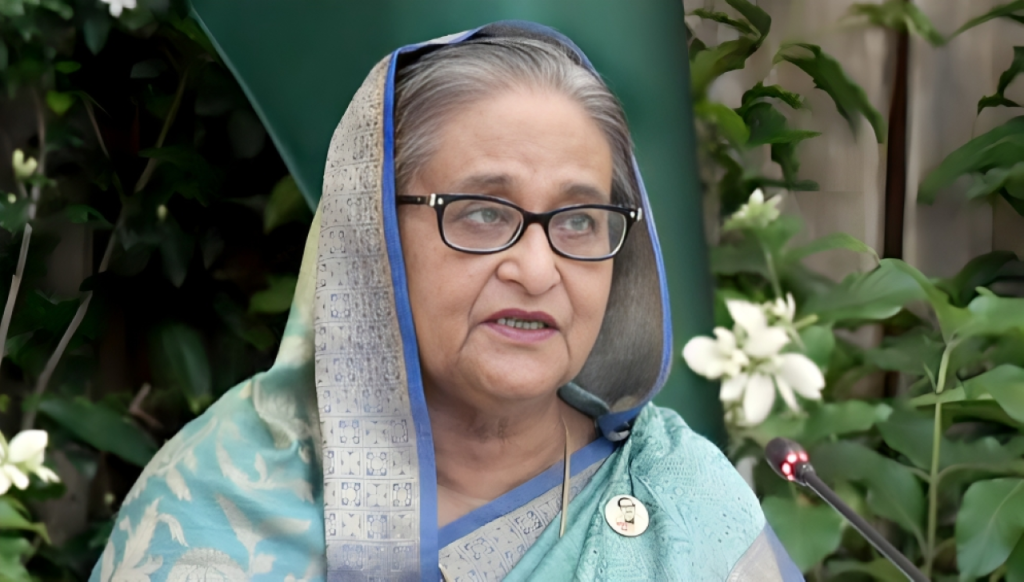Dhaka, Bangladesh – Prime Minister Sheikh Hasina has issued a strong warning, stating that BNP Chairperson Khaleda Zia may be sent back to prison should the party resort to excessive measures under the guise of an anti-government movement.

“If BNP crosses the limits, Khaleda Zia will be sent to jail again,” the Prime Minister declared while presiding over a discussion marking Jail Killing Day at the Bangabandhu International Conference Centre in Dhaka.

Table of Contents
Government’s Stance on BNP’s Political Activities
The Prime Minister emphasised that while the government permits BNP to hold peaceful meetings and processions, any attempt to incite violence will not be tolerated.
“We have allowed them to conduct meetings and processions peacefully. However, if they use sticks and create unrest, we will take strict action,” she stated.
Khaleda Zia, convicted in the Zia Orphanage Trust and Zia Charitable Trust corruption cases, was sentenced to ten years and seven years in prison, respectively. However, she has been residing at home after the government suspended her sentence on humanitarian grounds.
BNP’s Role in Democracy Questioned
Sheikh Hasina questioned BNP’s claim of fighting for democracy, arguing that the party itself was formed illegitimately by military ruler Ziaur Rahman.
“BNP is an illegal party as it was created by an unconstitutional government. How can such a party claim to be the saviour of democracy?” she asked.
The Premier also criticised those who portray Ziaur Rahman as a champion of democracy. She argued that Zia came to power unlawfully, declaring himself both President and Army Chief while executing numerous military officials under so-called trials.

Jail Killing Day Observance
The discussion commenced with a minute of silence in memory of the martyrs of August 15 and November 3, 1975. On this day in 1975, assassins stormed Dhaka Central Jail, killing four national leaders—Tajuddin Ahmed, Syed Nazrul Islam, Captain Mansur Ali, and AHM Qamaruzzaman—who had led Bangladesh’s Liberation War in the absence of Bangabandhu Sheikh Mujibur Rahman.
The day’s programme also included floral tributes at Bangabandhu’s portrait at Dhanmondi 32 and at the graves of the martyrs at Banani Graveyard.
Concerns Over BNP’s Leadership
The Prime Minister raised concerns about BNP’s leadership, highlighting that both its top leaders—Khaleda Zia and Tarique Rahman—have been convicted in corruption and criminal cases. Tarique Rahman, sentenced in multiple cases including the August 21 grenade attack and the ten-truck arms haul case, fled to London under the condition that he would abstain from politics.
Despite its constitution barring convicted individuals from leading the party, BNP has appointed Tarique Rahman as its chairperson. Sheikh Hasina criticised this move, stating, “BNP disregards its own constitution for personal gains.”
Awami League’s Development Agenda
Sheikh Hasina urged her party leaders to inform the public about the government’s development initiatives over the past 13 years, as the national election approaches.
“We will earn people’s trust by showcasing our work. The nation wants peace and development, not violence and destruction,” she said.
She warned voters against supporting BNP, citing its history of corruption, militancy, and governance failures. “The country remembers BNP’s misrule. People will choose stability and progress,” she asserted.
Ziaur Rahman’s Alleged Role in Political Murders
The Prime Minister reiterated her long-standing allegation that Ziaur Rahman was involved in the assassination of Bangabandhu and his family members on August 15, 1975, as well as the jail killings on November 3 of the same year.
“They initially tried to frame it as a personal vendetta, but the killings inside the jail proved it was a political conspiracy to reverse Bangladesh’s independence and turn it into another Pakistan,” she claimed.
She also accused Zia, Ershad, and Khaleda Zia of rehabilitating war criminals and assassins in politics by appointing them as ministers, MPs, and advisers.
